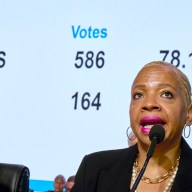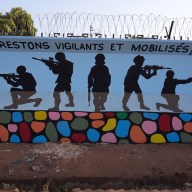COLOGNE, Germany – Canada got beat at its own game during a humbling couple weeks at the IIHF World Hockey Championship.
Unable to get on track early in the tournament, Mark Messier’s mix of young players and grinders never reached the emotional level necessary to make a serious run at gold. Instead, Canada’s tournament ended Thursday with a 5-2 loss to the powerhouse Russians in the quarter-finals.
The Canadians dropped four of their final five games and placed seventh — the country’s worst result at the event since it finished eighth in 1992.
“We all saw first-hand how important these world championships are to everybody,” said Canadian coach Craig MacTavish. “Normally Canada has a pretty decided advantage in terms of competitiveness, but in this tournament this year all the teams we played were highly competitive. They battled hard.”
It came as a surprise to a room full of baby-faced players who saw plenty of names they didn’t recognize when they scanned an opponent’s roster.
Messier was left with only one regret about how he handled his first major assignment as an executive with the national team.
“Looking back on it, one of the things I would have … spent more time on was educating our players about the world championship,” he said. “Especially the young players because of our lack of experience (about) just how tough this tournament is to win.”
They were only beginning to understand when the Russians came along. The Canadian team showed significant improvement in its final two games but ended up paying for early losses to Switzerland and Sweden because it earned them the toughest quarter-final matchup possible.
Canada was a heavy underdog against a Russian squad that featured 14 players who competed at the Vancouver Olympics. Corey Perry was the lone gold-medal winner from the Games to make the trip here for Canada.
Despite the gap in skill and experience, the decisive game was hard-fought and not nearly as lopsided as the final score suggested.
“I thought today actually we competed really hard and were in the game,” said Canadian captain Ray Whitney. “Our emotions with the penalties maybe got us a little bit. But the fight was there the whole time — we were here to compete.”
Added Russian veteran Sergei Fedorov: “I don’t think it was an easy game for anybody.”
Evgeni Malkin, with two, Maxim Afinogenov, Pavel Datsyuk and Fedorov — all Olympians — scored goals for Russia (7-0), which extended its world championship winning streak to 26 games.
John Tavares and Matt Duchene replied for Canada (3-4).
Messier’s team struggled to generate offence in its biggest games, scoring just six times during its four losses. They had a number of good chances to get on the scoreboard early against Russia but couldn’t beat Semyon Varlamov until they’d already fallen behind 3-0.
“I thought (it) was as good a team game as we played,” said MacTavish. “I thought our guys were very committed going into the game, we played a hard physical game, a passionate game, a great Canadian brand of hockey, and we just weren’t able to find the back of the net enough times.
“And it was a situation that really plagued us throughout the tournament.”
Goaltender Chris Mason also played a small part in the team’s struggles by allowing a couple untimely goals.
That could be seen against Russia when Afinogenov opened the scoring with 57.6 seconds left in the first period on a shot that dribbled through Mason’s arm and across the goal-line. Until that point, Canada had done an excellent job of weathering the storm in a charged atmosphere at Lanxess Arena.
Mason was attending this tournament for the fourth time and figured he was hurt by the fact it started a week or two later than usual.
“I think for all of us, for our team, having the break after the season really affected us,” he said. “It would have been nice to keep going.”
Ultimately, a team that featured seven players 20 or under might have learned a lesson that Hockey Canada had hoped would be imparted during a run to gold — winning at this level is difficult.
The Swiss, Swedish and Czech teams that beat Canada in the early stages of the tournament were all missing the majority of their star NHL players as well. But the players who came in their place didn’t simply roll over because they were facing a Canadian national team.
“A lot of the younger guys have played world juniors and I think now that they’ve come here they probably realize that they’re playing against a lot of proud countries,” said Mason. “Not to say that the juniors aren’t, but these guys are professionals. Just because they don’t play in the NHL doesn’t mean that they’re not great hockey players.”
Only time will tell if the young group took the lesson to heart.
The world championship has traditionally been toughest on the Canadian program in an Olympic year. The last time the country lost in the quarter-finals was 2002, when it was also fresh off a gold medal at the Games.
While the Canadians started arranging early flights home, Russia continued its push for a third consecutive gold medal at this event. For them, Thursday’s victory offered a little bit of revenge for the 7-3 quarter-final loss they absorbed from Canada in Vancouver.
However, as players from both sides pointed out, the memories of that game will linger until the team’s next face each other in a best-on-best competition.
“We’ll just take what we learned here and just try to push forward,” said Canadian forward Steven Stamkos. “Ultimately, your goal is 2014 and the Olympics. This is a great stepping stone for us, especially the young guys that were here.
“This will just make (us) hungrier.”
















